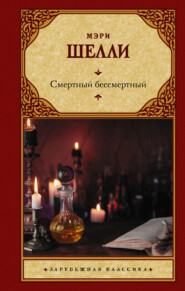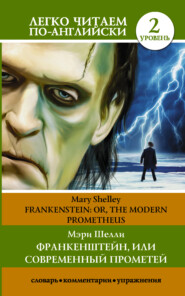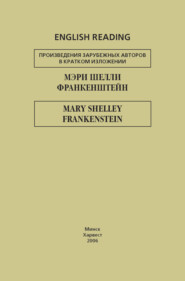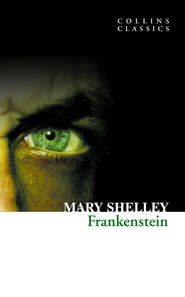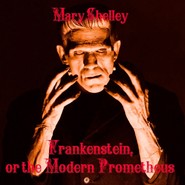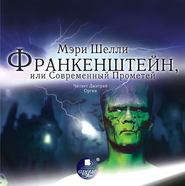По всем вопросам обращайтесь на: info@litportal.ru
(©) 2003-2024.
✖
Frankenstein, or The Modern Prometheus / Франкенштейн, или Современный Прометей
Настройки чтения
Размер шрифта
Высота строк
Поля
My father made no reproach in his letters and only took notice of my silence by inquiring into my occupations more particularly than before. Winter, spring, and summer passed away during my labours; but I did not watch the blossom or the expanding leaves-sights which before always yielded me supreme delight-so deeply was I engrossed in my occupation. The leaves of that year had withered before my work drew near to a close, and now every day showed me more plainly how well I had succeeded. But my enthusiasm was checked by my anxiety, and I appeared rather like one doomed by slavery to toil in the mines, or any other unwholesome trade than an artist occupied by his favourite employment. Every night I was oppressed by a slow fever, and I became nervous to a most painful degree; the fall of a leaf startled me, and I shunned my fellow creatures as if I had been guilty of a crime. Sometimes I grew alarmed at the wreck I perceived that I had become; the energy of my purpose alone sustained me: my labours would soon end, and I believed that exercise and amusement would then drive away incipient disease; and I promised myself both of these when my creation should be complete.
Chapter 5
It was on a dreary night of November that I beheld the accomplishment of my toils. With an anxiety that almost amounted to agony, I collected the instruments of life around me, that I might infuse a spark of being into the lifeless thing that lay at my feet. It was already one in the morning; the rain pattered dismally against the panes, and my candle was nearly burnt out, when, by the glimmer of the half-extinguished light, I saw the dull yellow eye of the creature open; it breathed hard, and a convulsive motion agitated its limbs.
How can I describe my emotions at this catastrophe, or how delineate the wretch whom with such infinite pains and care I had endeavoured to form? His limbs were in proportion, and I had selected his features as beautiful. Beautiful! Great God! His yellow skin scarcely covered the work of muscles and arteries beneath; his hair was of a lustrous black, and flowing; his teeth of a pearly whiteness; but these luxuriances only formed a more horrid contrast with his watery eyes, that seemed almost of the same colour as the dun-white sockets in which they were set, his shrivelled complexion and straight black lips.
The different accidents of life are not so changeable as the feelings of human nature. I had worked hard for nearly two years, for the sole purpose of infusing life into an inanimate body. For this I had deprived myself of rest and health. I had desired it with an ardour that far exceeded moderation; but now that I had finished, the beauty of the dream vanished, and breathless horror and disgust filled my heart. Unable to endure the aspect of the being I had created, I rushed out of the room and continued a long time traversing my bed-chamber, unable to compose my mind to sleep. At length lassitude succeeded to the tumult I had before endured, and I threw myself on the bed in my clothes, endeavouring to seek a few moments of forgetfulness. But it was in vain; I slept, indeed, but I was disturbed by the wildest dreams. I thought I saw Elizabeth, in the bloom of health, walking in the streets of Ingolstadt. Delighted and surprised, I embraced her, but as I imprinted the first kiss on her lips, they became livid with the hue of death; her features appeared to change, and I thought that I held the corpse of my dead mother in my arms; a shroud enveloped her form, and I saw the grave-worms crawling in the folds of the flannel. I started from my sleep with horror; a cold dew covered my forehead, my teeth chattered, and every limb became convulsed; when, by the dim and yellow light of the moon, as it forced its way through the window shutters, I beheld the wretch-the miserable monster whom I had created. He held up the curtain of the bed; and his eyes, if eyes they may be called, were fixed on me. His jaws opened, and he muttered some inarticulate sounds, while a grin wrinkled his cheeks. He might have spoken, but I did not hear; one hand was stretched out, seemingly to detain me, but I escaped and rushed downstairs. I took refuge in the courtyard belonging to the house which I inhabited, where I remained during the rest of the night, walking up and down in the greatest agitation, listening attentively, catching and fearing each sound as if it were to announce the approach of the demoniacal corpse to which I had so miserably given life.
Oh! No mortal could support the horror of that countenance. A mummy again endued with animation could not be so hideous as that wretch. I had gazed on him while unfinished; he was ugly then, but when those muscles and joints were rendered capable of motion, it became a thing such as even Dante could not have conceived.
I passed the night wretchedly. Sometimes my pulse beat so quickly and hardly that I felt the palpitation of every artery; at others, I nearly sank to the ground through languor and extreme weakness. Mingled with this horror, I felt the bitterness of disappointment; dreams that had been my food and pleasant rest for so long a space were now become a hell to me; and the change was so rapid, the overthrow so complete!
Morning, dismal and wet, at length dawned and discovered to my sleepless and aching eyes the church of Ingolstadt, its white steeple and clock, which indicated the sixth hour. The porter opened the gates of the court, which had that night been my asylum, and I issued into the streets, pacing them with quick steps, as if I sought to avoid the wretch whom I feared every turning of the street would present to my view. I did not dare return to the apartment which I inhabited, but felt impelled to hurry on, although drenched by the rain which poured from a black and comfortless sky.
I continued walking in this manner for some time, endeavouring by bodily exercise to ease the load that weighed upon my mind. I traversed the streets without any clear conception of where I was or what I was doing. My heart palpitated in the sickness of fear, and I hurried on with irregular steps, not daring to look about me:
Like one who, on a lonely road,
Doth walk in fear and dread,
And, having once turned round, walks on,
And turns no more his head;
Because he knows a frightful fiend
Doth close behind him tread.
[Coleridge's “Ancient Mariner.”]
Continuing thus, I came at length opposite to the inn at which the various diligences and carriages usually stopped. Here I paused, I knew not why; but I remained some minutes with my eyes fixed on a coach that was coming towards me from the other end of the street. As it drew nearer I observed that it was the Swiss diligence; it stopped just where I was standing, and on the door being opened, I perceived Henry Clerval, who, on seeing me, instantly sprung out. “My dear Frankenstein,” exclaimed he, “how glad I am to see you! How fortunate that you should be here at the very moment of my alighting!”
Nothing could equal my delight on seeing Clerval; his presence brought back to my thoughts my father, Elizabeth, and all those scenes of home so dear to my recollection. I grasped his hand, and in a moment forgot my horror and misfortune; I felt suddenly, and for the first time during many months, calm and serene joy. I welcomed my friend, therefore, in the most cordial manner, and we walked towards my college. Clerval continued talking for some time about our mutual friends and his own good fortune in being permitted to come to Ingolstadt. “You may easily believe,” said he, “how great was the difficulty to persuade my father that all necessary knowledge was not comprised in the noble art of book-keeping; and, indeed, I believe I left him incredulous to the last, for his constant answer to my unwearied entreaties was the same as that of the Dutch schoolmaster in The Vicar of Wakefield: 'I have ten thousand florins a year without Greek, I eat heartily without Greek.' But his affection for me at length overcame his dislike of learning, and he has permitted me to undertake a voyage of discovery to the land of knowledge.”
“It gives me the greatest delight to see you; but tell me how you left my father, brothers, and Elizabeth.”
“Very well, and very happy, only a little uneasy that they hear from you so seldom. By the by, I mean to lecture you a little upon their account myself. But, my dear Frankenstein,” continued he, stopping short and gazing full in my face, “I did not before remark how very ill you appear; so thin and pale; you look as if you had been watching for several nights.”
“You have guessed right; I have lately been so deeply engaged in one occupation that I have not allowed myself sufficient rest, as you see; but I hope, I sincerely hope, that all these employments are now at an end and that I am at length free.”
I trembled excessively; I could not endure to think of, and far less to allude to, the occurrences of the preceding night. I walked with a quick pace, and we soon arrived at my college. I then reflected, and the thought made me shiver, that the creature whom I had left in my apartment might still be there, alive and walking about. I dreaded to behold this monster, but I feared still more that Henry should see him. Entreating him, therefore, to remain a few minutes at the bottom of the stairs, I darted up towards my own room. My hand was already on the lock of the door before I recollected myself. I then paused, and a cold shivering came over me. I threw the door forcibly open, as children are accustomed to do when they expect a spectre to stand in waiting for them on the other side; but nothing appeared. I stepped fearfully in: the apartment was empty, and my bedroom was also freed from its hideous guest. I could hardly believe that so great a good fortune could have befallen me, but when I became assured that my enemy had indeed fled, I clapped my hands for joy and ran down to Clerval.
We ascended into my room, and the servant presently brought breakfast; but I was unable to contain myself. It was not joy only that possessed me; I felt my flesh tingle with excess of sensitiveness, and my pulse beat rapidly. I was unable to remain for a single instant in the same place; I jumped over the chairs, clapped my hands, and laughed aloud. Clerval at first attributed my unusual spirits to joy on his arrival, but when he observed me more attentively, he saw a wildness in my eyes for which he could not account, and my loud, unrestrained, heartless laughter frightened and astonished him.
“My dear Victor,” cried he, “what, for God's sake, is the matter? Do not laugh in that manner. How ill you are! What is the cause of all this?”
“Do not ask me,” cried I, putting my hands before my eyes, for I thought I saw the dreaded spectre glide into the room; “he can tell. Oh, save me! Save me!” I imagined that the monster seized me; I struggled furiously and fell down in a fit.
Poor Clerval! What must have been his feelings? A meeting, which he anticipated with such joy, so strangely turned to bitterness. But I was not the witness of his grief, for I was lifeless and did not recover my senses for a long, long time.
This was the commencement of a nervous fever which confined me for several months. During all that time Henry was my only nurse. I afterwards learned that, knowing my father's advanced age and unfitness for so long a journey, and how wretched my sickness would make Elizabeth, he spared them this grief by concealing the extent of my disorder. He knew that I could not have a more kind and attentive nurse than himself; and, firm in the hope he felt of my recovery, he did not doubt that, instead of doing harm, he performed the kindest action that he could towards them.
But I was in reality very ill, and surely nothing but the unbounded and unremitting attentions of my friend could have restored me to life. The form of the monster on whom I had bestowed existence was for ever before my eyes, and I raved incessantly concerning him. Doubtless my words surprised Henry; he at first believed them to be the wanderings of my disturbed imagination, but the pertinacity with which I continually recurred to the same subject persuaded him that my disorder indeed owed its origin to some uncommon and terrible event.
By very slow degrees, and with frequent relapses that alarmed and grieved my friend, I recovered. I remember the first time I became capable of observing outward objects with any kind of pleasure, I perceived that the fallen leaves had disappeared and that the young buds were shooting forth from the trees that shaded my window. It was a divine spring, and the season contributed greatly to my convalescence. I felt also sentiments of joy and affection revive in my bosom; my gloom disappeared, and in a short time I became as cheerful as before I was attacked by the fatal passion.
“Dearest Clerval,” exclaimed I, “how kind, how very good you are to me. This whole winter, instead of being spent in study, as you promised yourself, has been consumed in my sick room. How shall I ever repay you? I feel the greatest remorse for the disappointment of which I have been the occasion, but you will forgive me.”
“You will repay me entirely if you do not discompose yourself, but get well as fast as you can; and since you appear in such good spirits, I may speak to you on one subject, may I not?”
I trembled. One subject! What could it be? Could he allude to an object on whom I dared not even think?
“Compose yourself,” said Clerval, who observed my change of colour, “I will not mention it if it agitates you; but your father and cousin would be very happy if they received a letter from you in your own handwriting. They hardly know how ill you have been and are uneasy at your long silence.”
“Is that all, my dear Henry? How could you suppose that my first thought would not fly towards those dear, dear friends whom I love and who are so deserving of my love?”
“If this is your present temper, my friend, you will perhaps be glad to see a letter that has been lying here some days for you; it is from your cousin, I believe.”
Chapter 6
Clerval then put the following letter into my hands. It was from my own Elizabeth:
“My dearest Cousin,
“You have been ill, very ill, and even the constant letters of dear kind Henry are not sufficient to reassure me on your account. You are forbidden to write-to hold a pen; yet one word from you, dear Victor, is necessary to calm our apprehensions. For a long time I have thought that each post would bring this line, and my persuasions have restrained my uncle from undertaking a journey to Ingolstadt. I have prevented his encountering the inconveniences and perhaps dangers of so long a journey, yet how often have I regretted not being able to perform it myself! I figure to myself that the task of attending on your sickbed has devolved on some mercenary old nurse, who could never guess your wishes nor minister to them with the care and affection of your poor cousin. Yet that is over now: Clerval writes that indeed you are getting better. I eagerly hope that you will confirm this intelligence soon in your own handwriting.
“Get well-and return to us. You will find a happy, cheerful home and friends who love you dearly. Your father's health is vigorous, and he asks but to see you, but to be assured that you are well; and not a care will ever cloud his benevolent countenance. How pleased you would be to remark the improvement of our Ernest! He is now sixteen and full of activity and spirit. He is desirous to be a true Swiss and to enter into foreign service, but we cannot part with him, at least until his elder brother returns to us. My uncle is not pleased with the idea of a military career in a distant country, but Ernest never had your powers of application. He looks upon study as an odious fetter; his time is spent in the open air, climbing the hills or rowing on the lake. I fear that he will become an idler unless we yield the point and permit him to enter on the profession which he has selected.
“Little alteration, except the growth of our dear children, has taken place since you left us. The blue lake and snow-clad mountains-they never change; and I think our placid home and our contented hearts are regulated by the same immutable laws. My trifling occupations take up my time and amuse me, and I am rewarded for any exertions by seeing none but happy, kind faces around me. Since you left us, but one change has taken place in our little household. Do you remember on what occasion Justine Moritz entered our family? Probably you do not; I will relate her history, therefore in a few words. Madame Moritz, her mother, was a widow with four children, of whom Justine was the third. This girl had always been the favourite of her father, but through a strange perversity, her mother could not endure her, and after the death of M. Moritz, treated her very ill. My aunt observed this, and when Justine was twelve years of age, prevailed on her mother to allow her to live at our house. The republican institutions of our country have produced simpler and happier manners than those which prevail in the great monarchies that surround it. Hence there is less distinction between the several classes of its inhabitants; and the lower orders, being neither so poor nor so despised, their manners are more refined and moral. A servant in Geneva does not mean the same thing as a servant in France and England. Justine, thus received in our family, learned the duties of a servant, a condition which, in our fortunate country, does not include the idea of ignorance and a sacrifice of the dignity of a human being.
“Justine, you may remember, was a great favourite of yours; and I recollect you once remarked that if you were in an ill humour, one glance from Justine could dissipate it, for the same reason that Ariosto gives concerning the beauty of Angelica-she looked so frank-hearted and happy. My aunt conceived a great attachment for her, by which she was induced to give her an education superior to that which she had at first intended. This benefit was fully repaid; Justine was the most grateful little creature in the world: I do not mean that she made any professions I never heard one pass her lips, but you could see by her eyes that she almost adored her protectress. Although her disposition was gay and in many respects inconsiderate, yet she paid the greatest attention to every gesture of my aunt. She thought her the model of all excellence and endeavoured to imitate her phraseology and manners, so that even now she often reminds me of her.
Chapter 5
It was on a dreary night of November that I beheld the accomplishment of my toils. With an anxiety that almost amounted to agony, I collected the instruments of life around me, that I might infuse a spark of being into the lifeless thing that lay at my feet. It was already one in the morning; the rain pattered dismally against the panes, and my candle was nearly burnt out, when, by the glimmer of the half-extinguished light, I saw the dull yellow eye of the creature open; it breathed hard, and a convulsive motion agitated its limbs.
How can I describe my emotions at this catastrophe, or how delineate the wretch whom with such infinite pains and care I had endeavoured to form? His limbs were in proportion, and I had selected his features as beautiful. Beautiful! Great God! His yellow skin scarcely covered the work of muscles and arteries beneath; his hair was of a lustrous black, and flowing; his teeth of a pearly whiteness; but these luxuriances only formed a more horrid contrast with his watery eyes, that seemed almost of the same colour as the dun-white sockets in which they were set, his shrivelled complexion and straight black lips.
The different accidents of life are not so changeable as the feelings of human nature. I had worked hard for nearly two years, for the sole purpose of infusing life into an inanimate body. For this I had deprived myself of rest and health. I had desired it with an ardour that far exceeded moderation; but now that I had finished, the beauty of the dream vanished, and breathless horror and disgust filled my heart. Unable to endure the aspect of the being I had created, I rushed out of the room and continued a long time traversing my bed-chamber, unable to compose my mind to sleep. At length lassitude succeeded to the tumult I had before endured, and I threw myself on the bed in my clothes, endeavouring to seek a few moments of forgetfulness. But it was in vain; I slept, indeed, but I was disturbed by the wildest dreams. I thought I saw Elizabeth, in the bloom of health, walking in the streets of Ingolstadt. Delighted and surprised, I embraced her, but as I imprinted the first kiss on her lips, they became livid with the hue of death; her features appeared to change, and I thought that I held the corpse of my dead mother in my arms; a shroud enveloped her form, and I saw the grave-worms crawling in the folds of the flannel. I started from my sleep with horror; a cold dew covered my forehead, my teeth chattered, and every limb became convulsed; when, by the dim and yellow light of the moon, as it forced its way through the window shutters, I beheld the wretch-the miserable monster whom I had created. He held up the curtain of the bed; and his eyes, if eyes they may be called, were fixed on me. His jaws opened, and he muttered some inarticulate sounds, while a grin wrinkled his cheeks. He might have spoken, but I did not hear; one hand was stretched out, seemingly to detain me, but I escaped and rushed downstairs. I took refuge in the courtyard belonging to the house which I inhabited, where I remained during the rest of the night, walking up and down in the greatest agitation, listening attentively, catching and fearing each sound as if it were to announce the approach of the demoniacal corpse to which I had so miserably given life.
Oh! No mortal could support the horror of that countenance. A mummy again endued with animation could not be so hideous as that wretch. I had gazed on him while unfinished; he was ugly then, but when those muscles and joints were rendered capable of motion, it became a thing such as even Dante could not have conceived.
I passed the night wretchedly. Sometimes my pulse beat so quickly and hardly that I felt the palpitation of every artery; at others, I nearly sank to the ground through languor and extreme weakness. Mingled with this horror, I felt the bitterness of disappointment; dreams that had been my food and pleasant rest for so long a space were now become a hell to me; and the change was so rapid, the overthrow so complete!
Morning, dismal and wet, at length dawned and discovered to my sleepless and aching eyes the church of Ingolstadt, its white steeple and clock, which indicated the sixth hour. The porter opened the gates of the court, which had that night been my asylum, and I issued into the streets, pacing them with quick steps, as if I sought to avoid the wretch whom I feared every turning of the street would present to my view. I did not dare return to the apartment which I inhabited, but felt impelled to hurry on, although drenched by the rain which poured from a black and comfortless sky.
I continued walking in this manner for some time, endeavouring by bodily exercise to ease the load that weighed upon my mind. I traversed the streets without any clear conception of where I was or what I was doing. My heart palpitated in the sickness of fear, and I hurried on with irregular steps, not daring to look about me:
Like one who, on a lonely road,
Doth walk in fear and dread,
And, having once turned round, walks on,
And turns no more his head;
Because he knows a frightful fiend
Doth close behind him tread.
[Coleridge's “Ancient Mariner.”]
Continuing thus, I came at length opposite to the inn at which the various diligences and carriages usually stopped. Here I paused, I knew not why; but I remained some minutes with my eyes fixed on a coach that was coming towards me from the other end of the street. As it drew nearer I observed that it was the Swiss diligence; it stopped just where I was standing, and on the door being opened, I perceived Henry Clerval, who, on seeing me, instantly sprung out. “My dear Frankenstein,” exclaimed he, “how glad I am to see you! How fortunate that you should be here at the very moment of my alighting!”
Nothing could equal my delight on seeing Clerval; his presence brought back to my thoughts my father, Elizabeth, and all those scenes of home so dear to my recollection. I grasped his hand, and in a moment forgot my horror and misfortune; I felt suddenly, and for the first time during many months, calm and serene joy. I welcomed my friend, therefore, in the most cordial manner, and we walked towards my college. Clerval continued talking for some time about our mutual friends and his own good fortune in being permitted to come to Ingolstadt. “You may easily believe,” said he, “how great was the difficulty to persuade my father that all necessary knowledge was not comprised in the noble art of book-keeping; and, indeed, I believe I left him incredulous to the last, for his constant answer to my unwearied entreaties was the same as that of the Dutch schoolmaster in The Vicar of Wakefield: 'I have ten thousand florins a year without Greek, I eat heartily without Greek.' But his affection for me at length overcame his dislike of learning, and he has permitted me to undertake a voyage of discovery to the land of knowledge.”
“It gives me the greatest delight to see you; but tell me how you left my father, brothers, and Elizabeth.”
“Very well, and very happy, only a little uneasy that they hear from you so seldom. By the by, I mean to lecture you a little upon their account myself. But, my dear Frankenstein,” continued he, stopping short and gazing full in my face, “I did not before remark how very ill you appear; so thin and pale; you look as if you had been watching for several nights.”
“You have guessed right; I have lately been so deeply engaged in one occupation that I have not allowed myself sufficient rest, as you see; but I hope, I sincerely hope, that all these employments are now at an end and that I am at length free.”
I trembled excessively; I could not endure to think of, and far less to allude to, the occurrences of the preceding night. I walked with a quick pace, and we soon arrived at my college. I then reflected, and the thought made me shiver, that the creature whom I had left in my apartment might still be there, alive and walking about. I dreaded to behold this monster, but I feared still more that Henry should see him. Entreating him, therefore, to remain a few minutes at the bottom of the stairs, I darted up towards my own room. My hand was already on the lock of the door before I recollected myself. I then paused, and a cold shivering came over me. I threw the door forcibly open, as children are accustomed to do when they expect a spectre to stand in waiting for them on the other side; but nothing appeared. I stepped fearfully in: the apartment was empty, and my bedroom was also freed from its hideous guest. I could hardly believe that so great a good fortune could have befallen me, but when I became assured that my enemy had indeed fled, I clapped my hands for joy and ran down to Clerval.
We ascended into my room, and the servant presently brought breakfast; but I was unable to contain myself. It was not joy only that possessed me; I felt my flesh tingle with excess of sensitiveness, and my pulse beat rapidly. I was unable to remain for a single instant in the same place; I jumped over the chairs, clapped my hands, and laughed aloud. Clerval at first attributed my unusual spirits to joy on his arrival, but when he observed me more attentively, he saw a wildness in my eyes for which he could not account, and my loud, unrestrained, heartless laughter frightened and astonished him.
“My dear Victor,” cried he, “what, for God's sake, is the matter? Do not laugh in that manner. How ill you are! What is the cause of all this?”
“Do not ask me,” cried I, putting my hands before my eyes, for I thought I saw the dreaded spectre glide into the room; “he can tell. Oh, save me! Save me!” I imagined that the monster seized me; I struggled furiously and fell down in a fit.
Poor Clerval! What must have been his feelings? A meeting, which he anticipated with such joy, so strangely turned to bitterness. But I was not the witness of his grief, for I was lifeless and did not recover my senses for a long, long time.
This was the commencement of a nervous fever which confined me for several months. During all that time Henry was my only nurse. I afterwards learned that, knowing my father's advanced age and unfitness for so long a journey, and how wretched my sickness would make Elizabeth, he spared them this grief by concealing the extent of my disorder. He knew that I could not have a more kind and attentive nurse than himself; and, firm in the hope he felt of my recovery, he did not doubt that, instead of doing harm, he performed the kindest action that he could towards them.
But I was in reality very ill, and surely nothing but the unbounded and unremitting attentions of my friend could have restored me to life. The form of the monster on whom I had bestowed existence was for ever before my eyes, and I raved incessantly concerning him. Doubtless my words surprised Henry; he at first believed them to be the wanderings of my disturbed imagination, but the pertinacity with which I continually recurred to the same subject persuaded him that my disorder indeed owed its origin to some uncommon and terrible event.
By very slow degrees, and with frequent relapses that alarmed and grieved my friend, I recovered. I remember the first time I became capable of observing outward objects with any kind of pleasure, I perceived that the fallen leaves had disappeared and that the young buds were shooting forth from the trees that shaded my window. It was a divine spring, and the season contributed greatly to my convalescence. I felt also sentiments of joy and affection revive in my bosom; my gloom disappeared, and in a short time I became as cheerful as before I was attacked by the fatal passion.
“Dearest Clerval,” exclaimed I, “how kind, how very good you are to me. This whole winter, instead of being spent in study, as you promised yourself, has been consumed in my sick room. How shall I ever repay you? I feel the greatest remorse for the disappointment of which I have been the occasion, but you will forgive me.”
“You will repay me entirely if you do not discompose yourself, but get well as fast as you can; and since you appear in such good spirits, I may speak to you on one subject, may I not?”
I trembled. One subject! What could it be? Could he allude to an object on whom I dared not even think?
“Compose yourself,” said Clerval, who observed my change of colour, “I will not mention it if it agitates you; but your father and cousin would be very happy if they received a letter from you in your own handwriting. They hardly know how ill you have been and are uneasy at your long silence.”
“Is that all, my dear Henry? How could you suppose that my first thought would not fly towards those dear, dear friends whom I love and who are so deserving of my love?”
“If this is your present temper, my friend, you will perhaps be glad to see a letter that has been lying here some days for you; it is from your cousin, I believe.”
Chapter 6
Clerval then put the following letter into my hands. It was from my own Elizabeth:
“My dearest Cousin,
“You have been ill, very ill, and even the constant letters of dear kind Henry are not sufficient to reassure me on your account. You are forbidden to write-to hold a pen; yet one word from you, dear Victor, is necessary to calm our apprehensions. For a long time I have thought that each post would bring this line, and my persuasions have restrained my uncle from undertaking a journey to Ingolstadt. I have prevented his encountering the inconveniences and perhaps dangers of so long a journey, yet how often have I regretted not being able to perform it myself! I figure to myself that the task of attending on your sickbed has devolved on some mercenary old nurse, who could never guess your wishes nor minister to them with the care and affection of your poor cousin. Yet that is over now: Clerval writes that indeed you are getting better. I eagerly hope that you will confirm this intelligence soon in your own handwriting.
“Get well-and return to us. You will find a happy, cheerful home and friends who love you dearly. Your father's health is vigorous, and he asks but to see you, but to be assured that you are well; and not a care will ever cloud his benevolent countenance. How pleased you would be to remark the improvement of our Ernest! He is now sixteen and full of activity and spirit. He is desirous to be a true Swiss and to enter into foreign service, but we cannot part with him, at least until his elder brother returns to us. My uncle is not pleased with the idea of a military career in a distant country, but Ernest never had your powers of application. He looks upon study as an odious fetter; his time is spent in the open air, climbing the hills or rowing on the lake. I fear that he will become an idler unless we yield the point and permit him to enter on the profession which he has selected.
“Little alteration, except the growth of our dear children, has taken place since you left us. The blue lake and snow-clad mountains-they never change; and I think our placid home and our contented hearts are regulated by the same immutable laws. My trifling occupations take up my time and amuse me, and I am rewarded for any exertions by seeing none but happy, kind faces around me. Since you left us, but one change has taken place in our little household. Do you remember on what occasion Justine Moritz entered our family? Probably you do not; I will relate her history, therefore in a few words. Madame Moritz, her mother, was a widow with four children, of whom Justine was the third. This girl had always been the favourite of her father, but through a strange perversity, her mother could not endure her, and after the death of M. Moritz, treated her very ill. My aunt observed this, and when Justine was twelve years of age, prevailed on her mother to allow her to live at our house. The republican institutions of our country have produced simpler and happier manners than those which prevail in the great monarchies that surround it. Hence there is less distinction between the several classes of its inhabitants; and the lower orders, being neither so poor nor so despised, their manners are more refined and moral. A servant in Geneva does not mean the same thing as a servant in France and England. Justine, thus received in our family, learned the duties of a servant, a condition which, in our fortunate country, does not include the idea of ignorance and a sacrifice of the dignity of a human being.
“Justine, you may remember, was a great favourite of yours; and I recollect you once remarked that if you were in an ill humour, one glance from Justine could dissipate it, for the same reason that Ariosto gives concerning the beauty of Angelica-she looked so frank-hearted and happy. My aunt conceived a great attachment for her, by which she was induced to give her an education superior to that which she had at first intended. This benefit was fully repaid; Justine was the most grateful little creature in the world: I do not mean that she made any professions I never heard one pass her lips, but you could see by her eyes that she almost adored her protectress. Although her disposition was gay and in many respects inconsiderate, yet she paid the greatest attention to every gesture of my aunt. She thought her the model of all excellence and endeavoured to imitate her phraseology and manners, so that even now she often reminds me of her.
Вы ознакомились с фрагментом книги.
Приобретайте полный текст книги у нашего партнера:
Приобретайте полный текст книги у нашего партнера:







